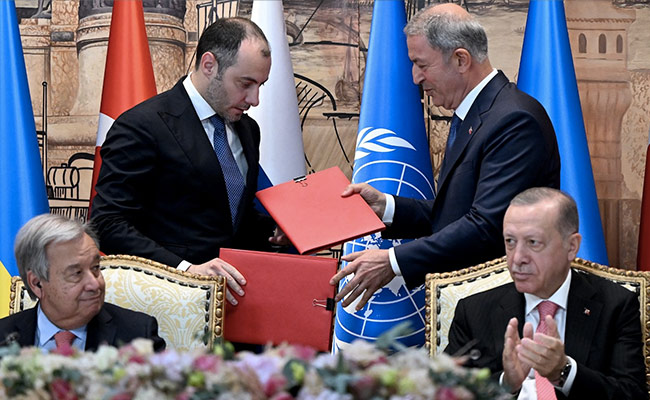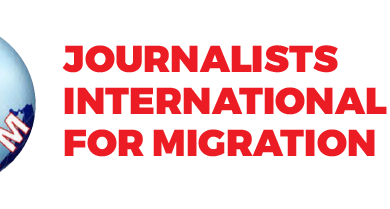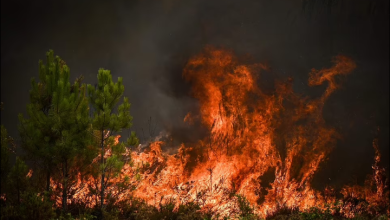To avert global food crisis, Ukraine, Russia sign deal for resumption of grain exports

- Accord unprecedented between warring countries, says UN
Ukraine and Russia have signed a United Nations-backed deal to allow export of millions of tonnes of grains from blocked Black Sea ports to avert threat of a catastrophic global food crisis.
A signing ceremony at Dolmabahçe Palace in Istanbul was attended by the UN Secretary-General, António Guterres and Turkey’s President, Recep Tayyip Erdoğan, who had played a crucial role during months of tense negotiations.
Guterres said at the ceremony that the deal would open the way to significant volumes of food exports from Ukraine and alleviate a parallel food and economic crisis in the developing world, saying: “The beacon of hope was shining bright in the Black Sea” and called on Russia and Ukraine to fully implement the accord.”
It is hoped the agreement will secure the passage of grains and essential goods such as sunflower oil from three Ukrainian ports including the Odesa Port, even as the war continues to rage elsewhere in the country. The UN had warned that the war risked mass malnutrition, hunger and famine.
International media reported that the deal is also aimed at ensuring the safe passage of Russian-made fertiliser products, essential for ensuring future high crop yields amid efforts to ease a global food crisis provoked by Russia’s invasion of Ukraine.
UN officials said they hoped preliminary shipments could begin today, with the hope of reaching prewar levels of exports from the three Ukrainian ports at the rate of 5m metric tonnes of grains a month within weeks.
The UN officials revealed that under the agreement struck between Kyiv and Moscow, a coalition of Turkish, Ukrainian and UN staff would monitor the loading of grains into vessels in Ukrainian ports before navigating a pre-planned route through the Black Sea, which had been heavily mined by Ukrainian and Russian forces.
Read Also: Water Resources Bill will enslave Ijaws, Niger-Delta people, says INC leader, Prof. Okaba
Ukrainian pilot vessels would guide commercial vessels transporting the grains to navigate the mined areas around the coastline using a map of safe channels provided by Ukraine.
The vessels will then cross the Black Sea towards Turkey’s Bosphorus strait, while being closely monitored by a joint coordination centre in Istanbul, containing representatives from the UN, Ukraine, Russia and Turkey.
Ships entering Ukraine will also be inspected under the supervision of the same joint coordination centre to ensure they are not carrying weapons or items that could be used to attack the Ukrainian side.
The Russian and Ukrainian sides have agreed to withhold attacks on any of the commercial vessels or ports engaged in the initiative to transport vital grains, while UN and Turkish monitors would be present in Ukrainian ports to demarcate areas protected by the accord.
Guterres said such a deal between the two warring countries was ‘unprecedented’ and that it would “bring relief for developing countries on the edge of bankruptcy and the most vulnerable people on the edge of famine. And it will help stabilise global food prices, which were already at record levels even before the war- a true nightmare for developing countries.
“Specifically, the initiative we just signed opens a path for significant volumes of commercial food exports from three key Ukrainian ports in the Black Sea-Odesa, Chernomorsk and Yuzhny. The shipment of grain and food stocks into world markets will help bridge the global food supply gap and reduce pressure on high prices.”
The agreement is the product of months of constant and difficult negotiations between UN officials, including Guterres and leading Russian and Ukrainian officials, who first broached the issue in April.
US officials had accused the Russian government of effectively “weaponising food” by taking Ukrainian grain hostage in an attempt to reduce the effects of sanctions on Russian exports. Still, the US and EU have both reassured businesses carrying Russian agricultural goods that they are not violating sanctions ahead of the signing of the deal.
Before the deal was announced yesterday, Kyiv said it had ruled out direct agreement with Moscow, adding: “Ukraine does not sign any documents with Russia. We will sign an agreement with Turkey and the UN,” presidential aide, Mykhaylo Podolyak wrote on Twitter. He said Russia would sign a separate “mirror” agreement.
Senior UN officials said prior to the signing of the agreement that demining Ukraine’s coastline was not seen as a viable option. Ukrainian officials had expressed concerns that removing defensive mines from their coastline would increase their vulnerability to Russian attacks.
But the agreement contains provisions for potential minesweeping operation by an agreed party to check that the maritime route for the ships remains safe, as well as a potential search and rescue vessel in the Black Sea.
UN officials emphasised that the deal to prevent attacks only included specific areas in Ukraine’s ports covered by the grain agreement, insisting that they had engaged with the shipping industry and insurers to ensure the commercial costs of insuring the grain shipments does not become punitive, thereby raising the cost of the grain
on the international market.
The details had been finalised after Erdoğan met Russian President, Vladimir Putin in Tehran earlier this week, officials in Ankara said. Turkey has the authority over sea traffic entering and leaving the Black Sea.
A Spokesperson for Erdoğan, İbrahim Kalın, said the arrangement would be “critical for global grain security.”
Ukraine is the world’s fifth-largest wheat exporter, but exports have badly stalled since the war began with about 20m tonnes of grain stuck in silos at Odesa close to the frontlines.
On Thursday night, office of the Turkish President said a general agreement had been reached on a UN-led plan during talks in Istanbul last week and that it would now be documented by the parties.
The US state department said on Thursday night that it welcomed the deal “in principle” and was focused on holding Russia accountable for implementing it.
Ukraine President, Volodymyr Zelenskiy, briefly mentioned the possible deal in his latest national address on Thursday evening, saying: “Tomorrow we also expect news for our state from Turkey – regarding the unblocking of our ports.”
Earlier on Thursday, Ukraine’s Deputy Agriculture Minister, Taras Vysotskiy, said the country could restart exports quickly. “The majority of the Odesa port infrastructure remains, so it is a question of several weeks in the event there are proper security guarantees,” he told Ukrainian television.
Moscow has denied responsibility for worsening the food crisis, blaming western sanctions instead for slowing its own food and fertiliser exports and Ukraine for mining its Black Sea ports.
Putin effectively called the deal a quid-pro-quo earlier in the week, saying Russia would “facilitate the exportation of Ukrainian grains, but we are proceeding from the fact that all restrictions relating to the export of Russian grains will be lifted.”
While the US did not sanction Russian grain exports, some shipping companies have avoided carrying Russian goods, because of the financial and reputations risks involved.
“As you know, Americans have essentially lifted restrictions on the supply of Russian fertilisers to global markets. If they sincerely want to improve the situation on the international food markets, I hope the same will happen with the supply of Russian grain for exports,” Putin said.




